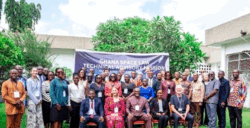As government plans to repeal certain taxes as part of its reforms, a development finance and economics expert, Dr. Eric Boakye Yiadom, maintains there is a need to broaden the tax net as a key strategy for driving economic growth.
He believes that broadening the tax net by ensuring everyone contributes to direct taxes can help prevent economic crises if some levies are abolished. “Government should have innovative means of trying to fill these gaps.”
The expert also recommended government to encourage more electronic transactions by introducing incentives in addition to the Credit Scoring System, a statistical tool that evaluates creditworthiness and determines the likelihood of default on credit obligations.
Another initiative proposed is leveraging the country’s natural resources, particularly in the mining sector, to boost economic growth.
According to a report by the Ghana Chamber of Mines, the mining sector contributed GH¢11.55billion (US$980million) in 2023, an 81.1 percent increase from GH¢6.38billion in 2022 – making it the largest source of domestic tax revenue.
The sector contributed 22.7 percent of direct taxes, underscoring its vital role in the economy. He also proposed government impose an appreciable amount of taxes or increase the taxes of small-scale miners as well.
However, Dr. Boakye Yiadom called for minimising tax waivers for foreign companies, calling for a more strategic approach. He notes that many foreign firms granted tax exemptions often exploit such incentives to achieve their goals before relocating to other countries, leaving Ghana at a disadvantage.
Also, to encourage Foreign Direct Investments (FDI), Dr. Boakye Yiadom suggested reducing Ghana’s corporate tax rate. He noted the country’s tax rate is higher than that of some other nations and lowering it could create a more favourable environment for both local and foreign companies.
During the launch of his 2024 manifesto, Ghana’s President John Dramani Mahama vowed to rescind several taxes within his first 120 days in office. These include the COVID-19 levy, E-Levy, 10 percent betting levy, emissions levy and import duties on vehicles and equipment for industrial and agricultural purposes.
Data show that the E-Levy generated approximately GH¢1.1billion in 2023, with projections of GH¢2.1billion for 2024. Similarly, the COVID-19 levy is anticipated to generate GH¢3.97billion in 2025, up from GH¢3.1billion for 2024 – while the betting tax is projected to contribute about GH¢1.2billion.










